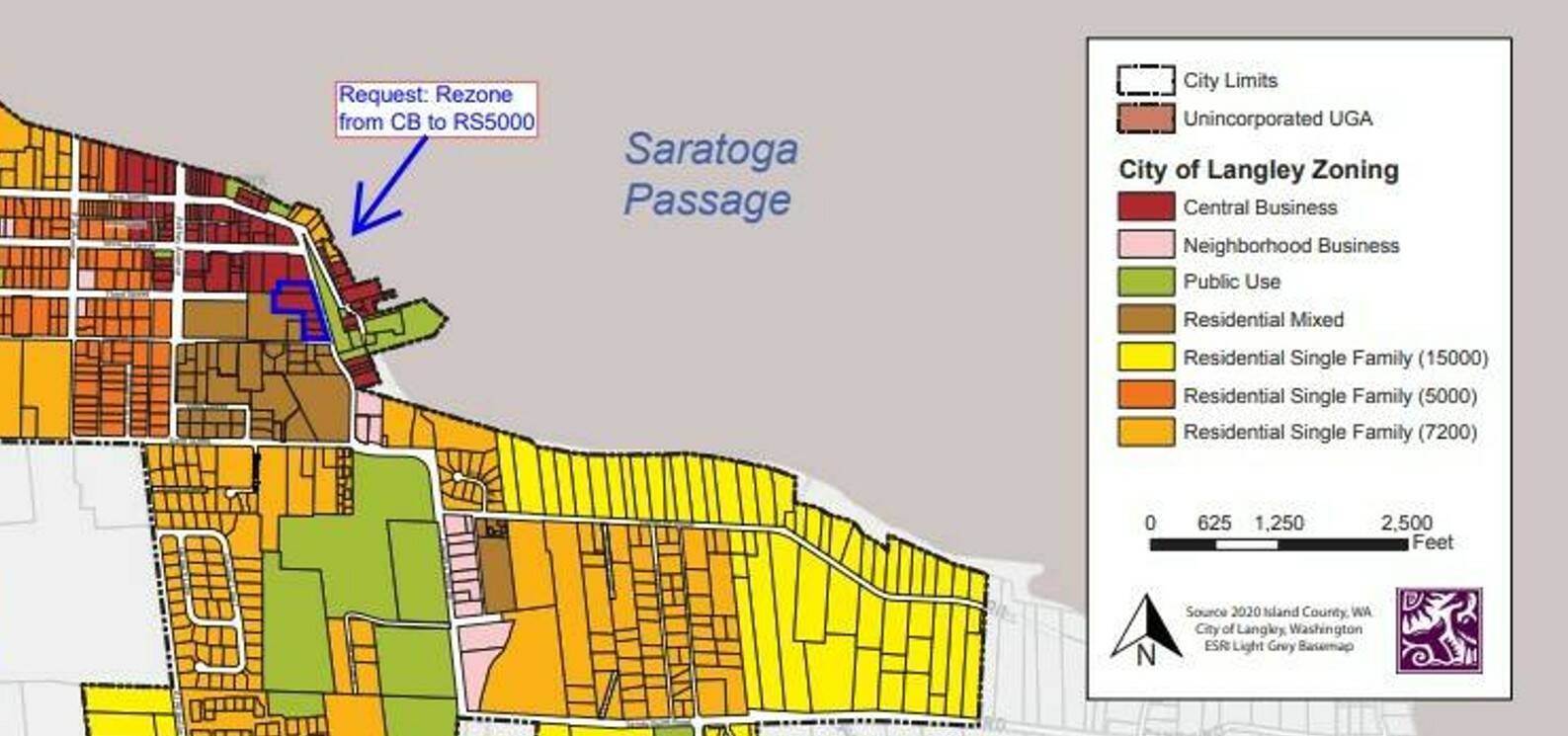After more consideration, the Langley City Council will not accept a request for a zoning change that would have limited the amount of available commercial area in the Village by the Sea.
A divided council voted Monday night to retain the current zoning of “central business” for a group of properties located along Cascade Avenue. At a meeting in June, the council mulled over the rezoning proposal from property owners hoping for their land and adjacent parcels to be changed to “residential single-family 5000” as part of the city’s comprehensive plan update.
In a letter to the council, requester Terry Sankey, who owns a vacant lot with his son and business partner, Peter Sankey, pointed to the increased value of a residential versus commercial property, the lack of infrastructure to accommodate any new structures and the scarcity of interest from buyers wanting to build anything commercial.
Both Planning Director Meredith Penny and the city’s citizen-led Planning Advisory Board advised against the zoning change since it would decrease commercial development in Langley. The parcels in question are located next to the downtown core.
On June 16, the council asked Penny to come back with another proposal for “neighborhood business” zoning, hoping to strike a compromise. But as council members learned during the meeting this week, it isn’t quite that simple.
As Penny explained, with neighborhood business zoning, multi-family development on this site is allowed but could reduce opportunities to focus new commercial development in one of the city’s more logical and strategic locations. Neighborhood business zoning does not allow for retail uses and is typically intended for isolated, commercial and mixed use areas that serve residential neighborhoods.
“Given this area’s immediate proximity to downtown, it would likely be more appropriate to retain the central business district zoning,” Penny said, though she did acknowledge that a zoning change could help support housing goals and add residential options within walking distance of downtown.
The PAB met July 2 and agreed with Penny and recommended that the council retain the current zoning.
Separate from this issue, the PAB recommended that the council initiate a public discussion about whether to allow retail uses in the neighborhood business zone as part of the city’s upcoming outreach on the comprehensive plan.
Councilmember Gail Fleming said that it seemed to her that neighborhood business is the best of both worlds in that it allows commercial but not retail, which she said seems to fit because there is no parking near that location and doesn’t seem appropriate for retail. Yet she saw a potential for multi-family housing.
Because of the name neighborhood business, Councilmember Craig Cyr said he would have thought that meant any development in that zone would include some business component, but Penny said this is not the case.
Councilmember Rhonda Salerno warned about bluff stability for the area in question. She wasn’t sure how big trucks would be able to make deliveries.
“Why should we leave several pieces of land so that we hope to get huge commercial buildings like we have downtown when we can’t even fill the vacancies of the commercial buildings we have?” she asked.
But as pointed out by Councilmember Chris Carlson in a previous meeting, there is a shortage of commercial space, according to the Langley Chamber of Commerce.
Carlson said he was torn and that he could see arguments on both sides. Multi-family development that mandates a certain percentage be affordable housing could be a win, but so could the growth of the city’s commercial core. Looking at the big picture, he said it might make sense to ensure there’s a logical progression from the businesses up Cascade Avenue to the Whidbey Island Center for the Arts and the South Whidbey Community Center.
Penny clarified that there’s not necessarily an affordable housing requirement for multi-family development in neighborhood business zoning.
Both Carlson and Cyr voted to keep the region’s zoning the same, as central business. Fleming voted in opposition. Salerno chose to abstain from the vote because she has friends who live in the area in question. Councilmember Harolynne Bobis was absent from the meeting.
None of the affected property owners spoke during the July 7 meeting.



